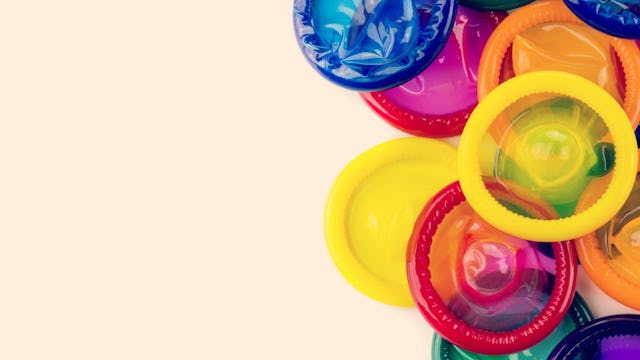Stop Putting Toxins In Your Vagina: Natural And Sustainable Sex Products For The Win

As women and moms, we have been bombarded with information on the importance of using natural products including everything from the soaps that we use to wash behind our kids’ ears to the scrambled eggs that we pile up on their plates in the morning.
But what about sexual health products? These products get placed inside of our bodies, next to our very permeable vaginal walls, and to tell you the truth, I haven’t thought enough about the chemicals that could be in them. They’re all sitting on the shelves at Target, so they have to be safe, right?
One female entrepreneur, Meika Hollender, began to research these products, and she realized that we actually need to start thinking about those chemicals that we place inside of our bodies. She created her company called Sustain, and she is making it her mission to provide the world with healthier sex products including condoms, lube, after-play wipes, and starting in mid-May, tampons.
Can we talk about lube for a second? Everyone I know uses lube (because babies) and I was shocked when I learned that many lubes are not even biocompatible with women’s bodies. They are meant to go inside of women’s bodies though, so WTF lube companies? You had one job. Most lubes also have a ton of chemicals that can irritate and break-down vaginal cells and they can freaking increase the transmission of sexually transmitted infections (STIs)? What? STIs are already on the rise, and they definitely don’t need any assistance from our lube.
Yes, STI rates are on the rise these days, especially with millennials. Maybe this is because everyone thinks they can depend on their IUDs which will protect them from getting pregnant but won’t protect them from getting STDs. Meika told Scary Mommy that “only about 21% of sexually active women ages 22 to 44 use condoms regularly.”
So we obviously need to use condoms to protect us. Meika stated, “Many women start to use condoms after they are done having kids because they don’t want to go back on the pill.” I will concur with this statement. But most condoms are made with a known carcinogen called nitrosomine. That shit is known, and I’m starting to feel like nothing is safe anymore, and it’s as if policymakers don’t have vaginas. Oh wait.
We also can’t forget about tampons. Did you know that most tampons are made with conventionally grown cotton, which is one of the most sprayed crops around, and then the cotton is whitened and chlorine bleach and deodorant are added? Then those little things just sit there marinating inside you for hours. Gross.
Sustain will be offering natural tampons this month. Meika told us that “the FDA does not require menstrual hygiene product manufacturers to disclose ingredients or conduct testing to determine their products’ long-term effects on women’s bodies.” Do I need to say this louder for the people in the back? This is concerning, folks.
Sustain’s website also states that, “When we leave menstrual hygiene up to the corporations — almost all historically run by men — the safety, comfort, and impact of products on vaginas is not considered a priority. And if you know us, then you know we won’t just sit idly by as nonorganic menstrual products continue to poison women and other menstruating people around the world.”
Furthermore, Meika told Scary Mommy, “If you’re going to change one thing, change your tampon, especially for mothers, who are usually the ones guiding their daughters in what types of menstrual hygiene products to use. It’s so important to get women using natural products at a young age because then they tend to stick with them.”
Sustain also donates 10% of their pre-tax profits through 10%4women to organizations like Planned Parenthood (which funds procedures like STI testing and breast cancer screenings). So, you can keep your hoo-ha healthy along with supporting other women to keep their hoo-ha’s healthy. It’s a win-win for everyone’s vagina. Really.
This article was originally published on